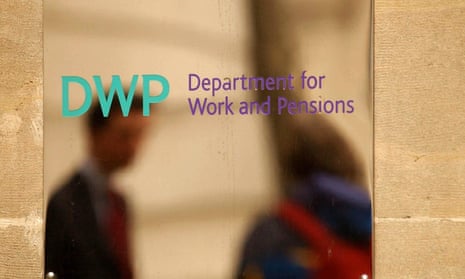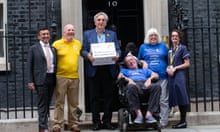The Department for Work and Pensions has agreed to change its controversial policy of cold-calling vulnerable and disabled people and trying to persuade them to accept lower benefit claims than they are legally entitled to.
The Guardian revealed last year that scores of disabled people who had appealed against a DWP decision on their benefit claim were called by officials and offered “decide right now” offers to abandon the appeal before it reached tribunal.
Having resisted calls to change their practice for more than a year, the DWP backed down the day before a judicial review challenge at the high court this week brought by a disabled claimant who said she was unfairly pressured into accepting a lower benefit offer.
The claimant, known as “K”, had argued that the DWP’s practice was unlawful and discriminatory. People had felt under pressure to accept the offer, sometimes worth thousands of pounds a year less than they were entitled to, were not told about their appeal rights, or given the opportunity to discuss the offer with representatives.
K had made a claim for the personal independence payment benefit in 2017 but was refused. She applied again in 2019 and was awarded only a small amount. She appealed against the decision after her GP advised her that her serious mobility problems meant she was entitled to the highest levels of benefit.
After the appeal process started, she was called by the DWP, without warning, from a “withheld” number and told she had an hour to accept a deal that was higher than her award but less than she was entitled to. She was told “tribunals are not very nice to go to” and asked if she wanted to risk losing all her benefit.
K, who has fibromyalgia and epilepsy, and needs help with daily washing, accepted the offer but said afterwards she felt pressured into making the decision. She said she was “haunted” by her choice and decided to challenge the DWP after seeing press reports exposing the practice.
She said: “I wasn’t given the time I needed to speak to my mum or seek any advice. They didn’t give me the information that I needed to work out if it was what I was entitled to, and they didn’t tell me I could accept the offer and still appeal the decision if I wanted.”
She added: “It feels as though the DWP has been picking on extremely vulnerable people and using the fear of going to a tribunal or losing an award to pressure people into accepting less than they should be getting.”
K was offered a deal that amounted to £1,500 a year less than she would have been entitled to if she had successfully pursued the tribunal.
Disability benefit decisions are notoriously unreliable, and the process of appealing against them is long and stressful. The vast majority of benefit appeals cases that reach tribunal find in favour of the claimants.
Sara Lomri, K’s solicitor at the Public Law Project, said: “Unfortunately, a practice has developed over the last few years at the DWP whereby benefits decision-makers have been putting pressure on eligible disabled benefits claimants to accept less than their statutory entitlement. Most people would be outraged if they knew that a friend or vulnerable relative was treated this way.
“Judicial review is always a last resort, and this case shows why there must be an accessible legal route for people to hold public authorities to account. The law is there for us all to follow, and when the state makes a mistake, acts unlawfully, and will not change itself, there must be a way to correct it.”
The Law for Life charity, which collected many of the cases, was also involved in the case.
The DWP, which was ordered to pay 90% of the costs of the case, has agreed to issue guidance to officials making it clear they should not make so-called “partial lapse” awards similar to that made to K. Staff involved in these cases will be given mandatory retraining.
A DWP spokesperson said: “Our overarching aim is that claimants are paid the correct amount of benefit at the earliest opportunity.
“We contact people if we can revise a decision and increase their benefits award as a result of new evidence becoming available after their appeal was lodged – and they always have the option to continue with their appeal or challenge a revised decision.
“We have addressed PLP’s concerns by improving our guidance on telephone calls so options and appeal rights are always clearly set out, as well as stopping making contact when a tribunal is imminent, and we are pleased they have withdrawn their case.”








